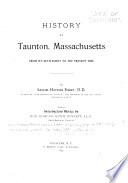Blacksmith101
Grumpy Old Man
- Jun 22, 2012
- 22,301
I happened upon a reference that could be helpful in the Text, History and Tradition standard that Heller established and Bruen affirmed while doing some genealogical research. I don't remember seeing this particular reference cited so I thought I would put it here where someone could find it. If it is widely known just delete the thread.
In August 1643 in the Plymouth Colony a list of all males aged 16 to 60 who were able to bear arms was compiled. This list is well documented. So prior to the militia act of 1792 which specified the minimum age to be 18 it was assumed, in at least one colony, the age to bear arms was 16.
Link to the list as published in a book published in 1855 (starts on page 167):

Link to a modern PDF copy of the list that is easier to read (it contains the names of several of my ancestors):
Link to "History of Taunton, Massachusetts: From Its Settlement to the Present Time" By Samuel Hopkins Emery pub. 1893; page 328; has the list of their eligible residents:

Starting at the bottom of page 329 of the "History of Taunton Massachusetts" they also mention the bringing of arms by militia members to church on Sundays (this is April 8, 1682) and on page 330 it even specifies the minimum amount of ammunition they should carry.
In August 1643 in the Plymouth Colony a list of all males aged 16 to 60 who were able to bear arms was compiled. This list is well documented. So prior to the militia act of 1792 which specified the minimum age to be 18 it was assumed, in at least one colony, the age to bear arms was 16.
Link to the list as published in a book published in 1855 (starts on page 167):
Records of the colony of New Plymouth, in New England : New Plymouth Colony : Free Download, Borrow, and Streaming : Internet Archive
Vols. 1-8, edited by N.B. Shurtleff; v. 9-12, by David Pulsifer
archive.org
Link to a modern PDF copy of the list that is easier to read (it contains the names of several of my ancestors):
Link to "History of Taunton, Massachusetts: From Its Settlement to the Present Time" By Samuel Hopkins Emery pub. 1893; page 328; has the list of their eligible residents:
History of Taunton, Massachusetts
books.google.com
Starting at the bottom of page 329 of the "History of Taunton Massachusetts" they also mention the bringing of arms by militia members to church on Sundays (this is April 8, 1682) and on page 330 it even specifies the minimum amount of ammunition they should carry.
Last edited:

